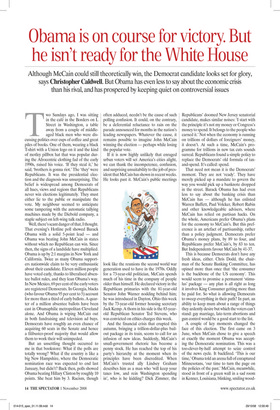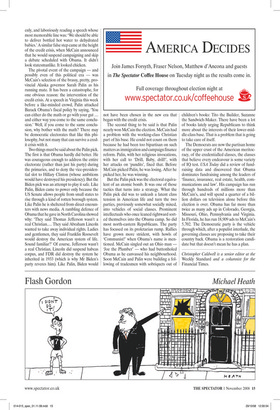Obama is on course for victory. But he isn’t ready for the White House
Although McCain could still theoretically win, the Democrat candidate looks set for glory, says Christopher Caldwell. But Obama has even less to say about the economic crisis than his rival, and has prospered by keeping quiet on controversial issues Two Sundays ago, I was sitting in the café in the Borders on L Street in Washington, a table away from a couple of middleaged black men who were discussing politics over cups of coffee and great piles of books. One of them, wearing a black T-shirt with a Union logo on it and the kind of motley pillbox hat that was popular during the Afrocentric clothing fad of the early 1990s, raised his voice. ‘If they steal it,’ he said, ‘brothers is gonna riot.’ The ‘they’ were Republicans. It was the presidential election and the diagnosis was unsurprising. The belief is widespread among Democrats of all hues, views and regions that Republicans never win elections legitimately. They must either lie to the public or manipulate the vote. My neighbour seemed to anticipate some tampering with the automatic tallying machines made by the Diebold company, a staple subject on left-wing talk radio.
Well, there’s scant danger of that, I thought. That evening’s Hotline poll showed Barack Obama with a solid 5-point lead — and Obama was beating John McCain in states without which no Republican can win. Since then, the signs of a landslide have multiplied. Obama is up by 2:1 margins in New York and California. Twice as many Obama supporters nationwide claim to be very enthusiastic about their candidate. Eleven million people have voted early, thanks to liberalised absentee ballot rules, and they lean Obama’s way. In New Mexico, 69 per cent of the early voters are registered Democrats. In Georgia, blacks (who favour Obama 95 per cent to 5) account for more than a third of early ballots. A quarter of a million absentee ballots have been cast in Obamaphilic metropolitan Cleveland alone. And Obama is wiping McCain out in both fundraising and television ad buys. Democrats have roughly an even chance of acquiring 60 seats in the Senate and hence a filibuster-proof majority that would allow them to work their will unimpeded.
But an unsettling thought occurred to me in that bookstore: What if the polls are totally wrong? What if the country is like a big New Hampshire, where the Democratic nomination race was expected to end last January, but didn’t? Back then, polls showed Obama beating Hillary Clinton by roughly 10 points. She beat him by 3. Racism, though often adduced, needn’t be the cause of such polling confusion. It could, on the contrary, be a deferential reluctance to rain on the parade announced for months in the nation’s leading newspapers. Whatever the cause, it remains possible to imagine John McCain winning the election — perhaps while losing the popular vote.
If it is now highly unlikely that enraged urban voters will set America’s cities alight, we can thank the incompetence, confusion, and surprising unsuitability to the job of president that McCain has shown in recent weeks. He looks past it. McCain’s public meetings look like the reunions the second world war generation used to have in the 1970s. Oddly for a 73-year-old politician, McCain spends much of his time in the company of people older than himself. He declared victory in the Republican primaries with the 81-year-old Senator John Warner nodding behind him; he was introduced in Dayton, Ohio this week by the 73-year-old former housing secretary Jack Kemp. A thorn in his side is the 83-yearold Republican Senator Ted Stevens, who was convicted on ethics charges this week.
And the financial crisis that erupted this autumn, bringing a trillion-dollar-plus bailout package in its train, seems to call for an infusion of new ideas. Suddenly, McCain’s small-government rhetoric has become a penny stock. He has reached the top of his party’s hierarchy at the moment when its principles have been discredited. When McCain’s trusted ally Lindsey Graham describes him as a man who ‘will keep your taxes low, and rein Washington spending in’, who is he kidding? Dick Zimmer, the Republicans’ doomed New Jersey senatorial candidate, makes similar noises: ‘I start with the principle it’s not my money or Congress’s money to spend. It belongs to the people who earned it.’ Not when the economy is running on trillions of dollars of foreigners’ money, it doesn’t. At such a time, McCain’s programme for trillions in new tax cuts sounds surreal. Republicans found a simple policy to replace the Democrats’ old formula of taxand-spend. It’s called: spend.
That need not mean it is the Democrats’ moment. They are not ‘ready’. They have merely picked up a mandate to govern the way you would pick up a banknote dropped in the street. Barack Obama has had even less to say about the banking crisis than McCain has — although he has enlisted Warren Buffett, Paul Volcker, Robert Rubin and other knowledgeable advisers, where McCain has relied on partisan hacks. On the whole, Americans prefer Obama’s plans for the economy to McCain’s. But this preference is an artefact of partisanship, rather than a policy judgment. Democrats prefer Obama’s money plans, by 89 to four, and Republicans prefer McCain’s, by 83 to ten. But Independents favour McCain by 41-37.
This is because Democrats don’t have any fresh ideas, either. Chris Dodd, the chairman of the Senate Banking Committee, has opined more than once that ‘the consumer is the backbone of the US economy’. This would seem to promise a permanent ‘stimulus’ package — any plan is all right as long it involves King Consumer getting more than he paid for. So what is allowing Democrats to sweep everything in their path? In part, an ability to keep mum about a range of things they ardently desire but which the voters can’t stand: gay marriage, late-term abortions and gun control would be a good start to the list.
A couple of key moments changed the face of this election. The first came on 3 June, when McCain chose to give a speech at exactly the moment Obama was accepting the Democratic nomination. This was a too-clever-by-half attempt to seize control of the news cycle. It backfired. ‘This is our time,’ Obama told an arena full of enraptured Minnesotans, ‘our time to turn the page on the policies of the past.’ McCain, meanwhile, stood in front of a green wall in a sad room in Kenner, Louisiana, blinking, smiling wood enly, and laboriously reading a speech whose most memorable line was: ‘We should be able to deliver bottled hot water to dehydrated babies.’ A similar false step came at the height of the credit crisis, when McCain announced that he would suspend campaigning and skip a debate scheduled with Obama. It didn’t look statesmanlike. It looked chicken.
The pivotal event of the campaign — and possibly even of this political era — was McCain’s selection of the brassy, pretty, provincial Alaska governor Sarah Palin as his running mate. It has been a catastrophe, for one obvious reason: the intervention of the credit crisis. At a speech in Virginia this week before a like-minded crowd, Palin attacked Barack Obama’s fiscal policy by saying, ‘You can either do the math or go with your gut ... and either way you come to the same conclusion.’ Well, if you come to the same conclusion, why bother with the math? There may be democratic electorates that like this philosophy, but not many that can survive a credit crisis with it.
Two things must be said about the Palin pick. The first is that Obama hardly did better. He was courageous enough to address the entire electorate (rather than just his party) during the primaries, and to deny the vice-presidential slot to Hillary Clinton (whose ambitions would have destroyed his presidency). But the Biden pick was an attempt to play it safe. Like Palin, Biden came to power only because the US Senate allows people from small states to rise through a kind of rotten borough system. Like Palin he is sheltered from direct encounters with news media. A rambling defence of Obama that he gave in North Carolina showed why: ‘They said Thomas Jefferson wasn’t a real Christian.... They said Abraham Lincoln wanted to take away individual rights. Ladies and gentlemen, they said Franklin Roosevelt would destroy the American system of life. Sound familiar?’ Of course, Jefferson wasn’t a real Christian, Lincoln did suspend habeas corpus, and FDR did destroy the system he inherited in 1933 (which is why Mr Biden’s party reveres him). Like Palin, Biden would not have been chosen in the new era that began with the credit crisis.
The second thing to be said is that Palin nearly won McCain the election. McCain had a problem with the working-class Christian part of his base. He could not count on them because he had been too bipartisan on such matters as immigration and campaign finance reform. Palin, with her religious invocations, with her call to ‘Drill, Baby, drill!’, with her attacks on ‘pundits’, fixed that. Before McCain picked Palin, he was losing. After he picked her, he was winning.
But the Palin pick was the electoral equivalent of an atomic bomb. It was one of those tactics that turns into a strategy. What the Palin pick did was to unleash a latent class tension in American life and turn the two parties, previously somewhat socially mixed, into vehicles of social classes. Prominent intellectuals who once leaned rightward sorted themselves into the Obama camp. So did most north-eastern Republicans. The party has focused on its proletarian rump. Rallies have grown more strident, with howls of ‘Communist!’ when Obama’s name is mentioned. McCain singled out an Ohio man — ‘Joe the Plumber’ — who had buttonholed Obama as he canvassed his neighbourhood. Soon McCain and Palin were building a following of tradesmen with sobriquets out of children’s books: Tito the Builder, Suzanne the Sandwich-Maker. There have been a lot of books lately urging Republicans to think more about the interests of their lower-middle-class base. That is a problem that is going to take care of itself.
The Democrats are now the partisan home of the upper crust of the American meritocracy, of the credentialled classes, the classes that believe every endeavour is some variety of IQ test. USA Today did a review of fundraising data and discovered that Obama dominates fundraising among the leaders of ‘finance, insurance, real estate, health, communications and law’. His campaign has run through hundreds of millions more than McCain’s, and will spend a quarter of a billion dollars on television alone before this election is over. Obama has far more than twice as many ads up in Colorado, Georgia, Missouri, Ohio, Pennsylvania and Virginia. In Florida, he has run 18,909 ads to McCain’s 5,702. The Democratic party is the vehicle through which, after a populist interlude, the governing classes are proposing to take their country back. Obama is a restoration candidate but that doesn’t mean he has a plan.



































































































 Previous page
Previous page